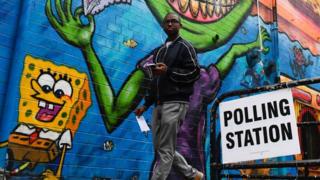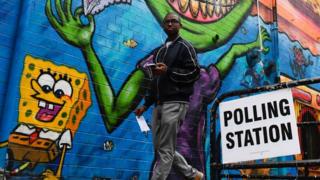Could there be an early general election?
If MPs agree to vote for an early general election, how quickly could it take place? …

 Image copyright Getty Images
Image copyright Getty Images There is already talk of a third attempt to hold an early general election, after MPs’ return to Parliament.
But why were the previous efforts unsuccessful and why does Prime Minister Boris Johnson want an election anyway?
Why does the prime minister want an early election?
The next election isn’t due until 2022 – but Mr Johnson wants an early election to try to restore the Conservative Party’s majority in the Commons.
At the moment, if every non-Conservative MP voted against the government, it would lose by 43 votes.
While calling an early election carries risks, Mr Johnson would aim to end the political stalemate and make it easier to deliver Brexit.
Why can’t the government just call an early election?
Prime ministers used to be able to call an early election at the time of their choosing. But under the Fixed-term Parliaments Act (FTPA), Mr Johnson now needs the support of two-thirds of MPs – at least 434 – to trigger an early poll.
The prime minister has already tried this route twice but the Commons blocked it. Many MPs say they did not believe Mr Johnson’s assurances an election would be held before the 31 October Brexit deadline.
They worry this could lead to a no-deal Brexit.
That’s because the prime minister chooses the election date. Under the FTPA, MPs simply vote on whether they agree with the statement “that there shall be an early parliamentary general election”.
Labour leader Jeremy Corbyn says he will support an early election but only once the Brexit deadline has been extended.
What happens if MPs vote to trigger an early election?
It is possible the government will make a third attempt to hold an early election.
While it’s unlikely MPs will support this, if it was successful, the prime minister would then recommend the date of the poll to the Queen.
Parliament would then be dissolved 25 working days before an election takes place. At this point, politicians stop being MPs and campaign for re-election, if they choose to stand again.
But given the amount of time it takes to organise an election, it won’t be possible to hold one by 31 October.
So, the earliest possible date for an election would be early November – and even that’s assuming MPs back an election vote immediately.
Does the prime minister have other options?
While the FTPA requires a two-thirds majority to hold an early election, it is not impossible for a government to get round this requirement.
It could do so by introducing a very short law that calls for an election and adds “notwithstanding the Fixed-term Parliaments Act”.
The advantage of this route, from the government’s point of view, is it would require only a simple majority of MPs to support it (more voting for than against) rather than two-thirds.
It would also allow an election date to be set in stone, which might make some MPs more likely to vote for it – although, there’s still no guarantee the government would win.
However, this route would mean an election would take longer to organise. That’s because the proposed law would need to clear the House of Lords, as well as the House of Commons.
There is also a risk the legislation could be amended – allowing pro-Remain MPs to make changes, such as extending the Brexit deadline.
What about an election through a no-confidence motion?
A third possible route to an early election is through a motion of no confidence in the government.
Some Conservatives are actively encouraging the opposition to do this. The Attorney General, Geoffrey Cox, has goaded Labour, claiming it is “too cowardly to give it a go”.
If the opposition called for a no-confidence vote, MPs would then decide whether they wanted the current government to continue.
If the vote passed, opposition parties would be allowed two weeks to come together to try to form an alternative government.
If this happened, Mr Johnson would be expected to resign and a new prime minister would take over.
But if nothing was resolved during those two weeks, a general election would be automatically triggered.
From Labour’s point of view, if a vote of no confidence was called now and resulted in a general election, it would mean the campaign would take place over 31 October – a situation that could risk a no-deal Brexit.
This is why Labour is reluctant to call one right now.
If the government felt it had no other way of triggering an early election, it could in theory call a motion of confidence in itself.
Normally, such a situation would be extremely unlikely, according to Catherine Haddon, from the Institute for Government think tank.
“But in the current climate, anything is possible”, she adds.




